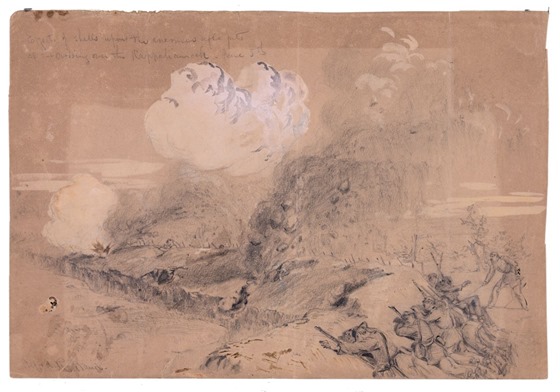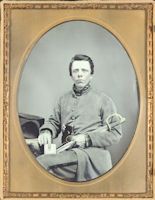5th. Big scuffle with Rob yesterday. Makes me somewhat sore. Played a game of chess with John. Read the Atlantic which A. B. lent me. Called on him. Rather better than for some time. Up most all day. Called at Mrs. Vickery’s and got Shakespeare and some other books. Very pleasant.
Wednesday, June 5, 2013
June 5—Marched until 4 o’clock this evening— twenty miles to-day.
June 5th. Slight firing heard at Port Hudson, from twelve, midnight, until two o’clock A. M.; at four A. M. firing again heard at Port Hudson. Nothing of importance occurred during the remainder of this day, although our army in the rear of and fleet below Port Hudson, engaged with the enemy. Having the range of their batteries, our forces, army and naval, have made some splendid shots this day, hitting their target and plowing up the earth around every time. Our mortar schooners must be a source of great annoyance to the enemy, both night and day, since they are continually at work practicing upon their mark, and seldom fail in hitting same, or coming so near to it, that it can be anything but agreeable to the parties who have to stand and take it, and are holding out so long at Port Hudson, I mean the rebs. They pass many sleepless nights, I can assure you, with these missiles of destruction, the shell of the bombers, flying over their heads, sometimes exploding in the air, other times on terra firma, close at their feet.
June 5 — Things are tolerable this morning — some shooting going on as usual on our lines. We are still held as reserve at the same place. 7 o’clock p.m. — I feel very unwell and have been all day. 9 o’clock — all is quiet tonight. Oh! Lord watch over us while we sleep tonight. W.R.C.
 Effects of shells upon the enemies rifle pits at the crossing over the Rappahannock. Shelling of 2nd Florida confederate regiment, Battle of Franklin’s Crossing. Drawing by Alfred R. Waud
Effects of shells upon the enemies rifle pits at the crossing over the Rappahannock. Shelling of 2nd Florida confederate regiment, Battle of Franklin’s Crossing. Drawing by Alfred R. Waud
drawing on tan paper : pencil, ink wash, and Chinese white ; 23.8 x 35.0 cm. (sheet)
Library of Congress image.
Friday, June 5th, 1863. (In the cellar.)—Wednesday evening H. said he must take a little walk, and went while the shelling had stopped. He never leaves me alone long, and when an hour had passed without his return I grew anxious; and when two hours, and the shelling had grown terrific, I momentarily expected to see his mangled body. All sorts of horrors fill the mind now, and I am so desolate here; not a friend. When he came he said that passing a cave where there were no others near, he heard groans, and found a shell had struck above and caused the cave to fall in on the man within. He could not extricate him alone, and had to get help and dig him out. He was badly hurt, but not mortally. I felt fairly sick from the suspense.
Yesterday morning a note was brought H. from a bachelor uncle out in the trenches, saying he had been taken ill with fever, and could we receive him if he came? H. sent to tell him to come, and I arranged one of the parlors as a dressing-room for him, and laid a pallet that he could move back and forth to the cellar. He did not arrive, however. It is our custom in the evening to sit in the front room a little while in the dark, with matches and candles held ready in hand, and watch the shells, whose course at night is shown by the fuse. H. was at the window and suddenly sprang up, crying, “Run!”—”Where?”—”Back!”
I started through the back room, H. after me. I was just within the door when the crash came that threw me to the floor. It was the most appalling sensation I’d ever known. Worse than an earthquake, which I’ve also experienced. Shaken and deafened I picked myself up; H. had struck a light to find me. I lighted mine, and the smoke guided us to the parlor I had fixed for Uncle J. The candles were useless in the dense smoke, and it was many minutes before we could see. Then we found the entire side of the room torn out. The soldiers who had rushed in said, “This is an eighty-pound Parrott.” It had entered through the front and burst on the pallet-bed, which was in tatters; the toilet service and everything else in the room was smashed. The soldiers assisted H. to board up the break with planks to keep out prowlers, and we went to bed in the cellar as usual. This morning the yard is partially plowed by two shells that fell there in the night. I think this house, so large and prominent from the river, is perhaps mistaken for headquarters and specially shelled. As we descend at night to the lower regions, I think of the evening hymn that grandmother taught me when a child:
“Lord, keep us safe this night,
Secure from all our fears;
May angels guard us while we sleep,
Till morning light appears.”
![]()
______
Note: To protect Mrs. Miller’s job as a teacher in New Orleans, the diary was published anonymously, edited by G. W. Cable, names were changed and initials were often used instead of full names — and even the initials differed from the real person’s initials.June 5.—Contrabands in the vicinity of Suffolk, Va., having signified their intention of serving the United States as armed soldiers, orders were issued by Major-General Peck to Captain John Wilder, “to recruit a company of colored troops, subject to no molestation in removing those so recruited to the place of rendezvous, at Craney Island.”—A Squadron of the Sixth New-York Cavalry, commanded by Major William P. Hall, on an expedition from Yorktown, Va., to Warwick River, succeeded in destroying twenty-three boats and one schooner belonging to the rebels.—Brigadier-general Alexander P. Stewart, of the rebel army, having been promoted to the rank of Major-General, took leave of his brigade, and assumed command in the corps of General Hardee, at Wartrace, Tenn. -—Chattanooga Rebel, June 7.
—The steamer Isaac Smith, which was captured by the rebels on the first of February last, was sunk while trying to run the blockade of Charleston, S. C., by the national gunboat Wissahickon.—The rebel privateer Alabama, in latitude 14° S., longitude 34° W., captured and destroyed the ship Talisman.—The Second division of the Sixth army corps, under the command of General A. P. Howe, crossed the Rappahannock River at Deep Run, on a rcconnoissance. During the passage of the river, the rebel sharp-shooters made some opposition, and after the division had crossed there was some brisk skirmishing, the rebel rifle-pits were carried, and over thirty prisoners captured. The National casualties were six killed and thirty-five wounded, among the former Captain Charles E. Cross, of the engineers.—(Doc. 5.)
by John Beauchamp Jones
JUNE 5TH.—More unofficial dispatches from the Mississippi. It is said Kirby Smith has defeated the enemy at Port Hudson; but how could his army get over the river? It is also stated that Grant’s losses have been 40,000, and ours 5,000. Who could have computed them? But they go on to say nothing has .been heard from Vicksburg since Sunday, four days previously; and that heavy firing was heard still on Thursday.
Lee’s army is in motion—that means something; and it is generally believed that Stuart is out on a raid into the enemy’s country.
Mr. M. A. Malsby, a Georgian, disabled by a wound in the first battle of Manassas, has published one-half of my new “Wild Western Scenes ;” the balance to appear when he can get paper. He publishes 5000 copies of about 130 pages. The paper costs nearly one dollar per pound, over $40 per ream. The printing costs $2 per 1000 ems. But then he retails the pamphlet at $1.25, and pays me 12½ cents copyright on each number sold.
5th.—Our household circle has been broken to-day, by Mrs. S. and her daughter B. leaving it for South Carolina. We are grieved to give them up.
Friday, 5th.—All quiet except sharp-shooting, but that is everlasting. Yankees digging toward us.










